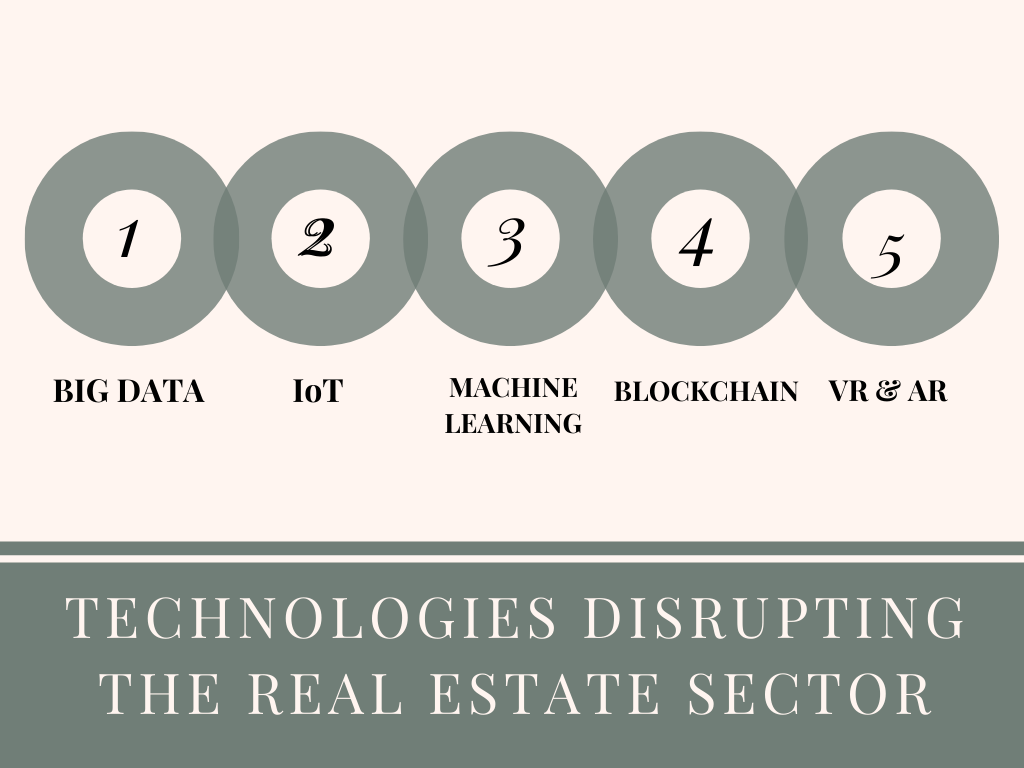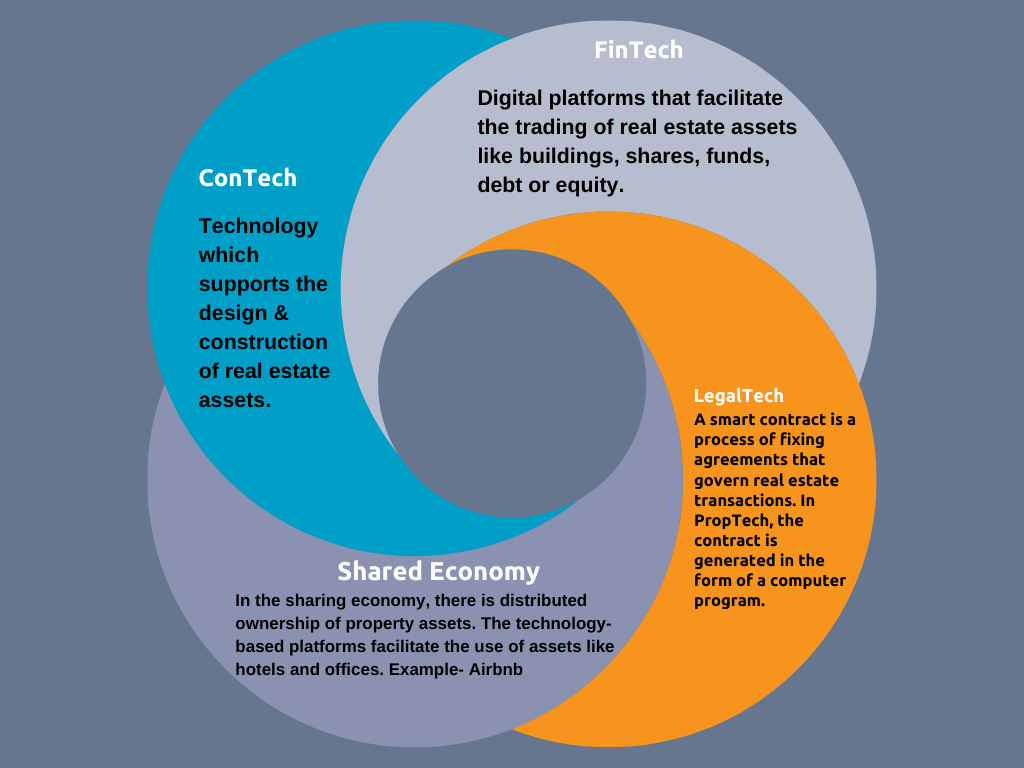The real estate sector is known for following the traditional ways of interacting with sellers, buyers, and lending institutions. However, with disruptive technologies changing the way businesses are conducted, investors today seek more out of their property construction, buying or selling experience. They look towards platforms that allow them to streamline their work or handle multiple activities at the comfort of their home. Luckily, with the advent of PropTech, the real estate landscape is now transforming.
If you are new to the residential or commercial real estate world, then “PropTech” is a buzzword you must have heard people exchange with each other. Here, we’ll be discussing how this technology has revolutionized the real estate industry and why is it considered a panacea to post-pandemic challenges.
But first, let us decode what this term entails.
What is PropTech?
Property Technology or PropTech refers to the use of information and disruptive technologies in the optimization and management of real estate projects. From processing financial transactions through blockchain to managing lead pipeline on CRM software, there are a number of ways in which these technologies are changing the face of the sector.
Not limited to agents and investors, property technologies provide assistance to all the stakeholders of real estate projects. It helps builders in project development, agents in sales, advisors and consultants in research, and property managers in overseeing their assets. It also helps homeowners in umpteen ways. For instance, mobile applications designed through PropTech can help the residents of society to register their visitor details or can help tenants pay rent.
Which Technologies are Disrupting the Real Estate Industry?
PropTech is an amalgamation of technologies that help in streamlining organizational work, marketing real estate assets, improving connectivity, making financial transactions transparent, and using smart materials in construction. Here are some of the technologies which are being used exhaustively in the real estate industry.

Based on whether the technology has to be used for conducting financial transactions or for making the building smarter, they are categorized into the following subsets:

What are the Benefits of PropTech?
Although the advancements in the field have barely scraped the surface, they have still shown tremendous success. PropTech has equipped the developers, agents, landlords, buyers, and sellers with exceptional tools to make their real estate journey smooth and more fruitful. From providing useful data to assisting in sales and advertisement, here is how the technology is transforming the industry:
1. Data-Driven Decisions
PropTech offers a platform for developers, agents, consultancy firms, etc for collecting and analyzing data. This allows various stakeholders to study market trends, understanding buyer requirements, and competitor strategies. Such information helps in making informed decisions with a minimum number of resources.
2. Data Storage
Before cloud computing, real estate agents and companies relied on physical data rooms to make decisions about their portfolios. However, with the advent of PropTech, companies can now store their documents on external servers and access the data over the internet from every corner of the world. This encourages transparent transactions, saves money and allows you to work on the go.
| Cloud Computing Service Models | Use |
| Infrastructure as a Service (IAAS) | IAAS offers network, storage, and virtualization resources to consumers on a pay-as-you-go basis. This creates a flexible environment and allows you to scale your operations as per your needs and requirements. |
| Platform as a Service (PAAS) | This platform allows your company to design, manage, and operate software applications. Microsoft Azure is the most suitable example of this type of PropTech. |
| Software as a Service (SaaS) | Software with “ready-to-use” applications are SaaS platforms. Here, you can use applications over the internet without having to install them on the hardware. Customer relationship management, marketing automation, and property management are some applications of SaaS platforms. |
2. Better Advertisement
Digital real estate has opened new avenues for advertising and marketing real estate properties and services. From lead generation to funnel optimization, advertisers have multiple tools at their disposal to generate brand awareness and convert leads to clients.
3. Sales Assistance
Technological advancements are made to provide added assistance to individuals and firms and PropTech is no different. From publishing listings online to offering 3D virtual tours, this technology has made the buying-selling process easy and convenient.
4. Improved Communication
PropTech has severely helped in improving communication throughout the real estate industry. Companies and agents can stay well connected with their prospective customers through apps and chatbots and keep them updated on the progress of projects.
While tools like chatbots help resolve user queries within minutes, there are other advanced tools which have improved the functioning of the real estate industry. For example, special platforms like Whiteboard have enhanced communication between landlords and tenants. It lets property managers or landlords convey relevant information to the tenants, and owners can also directly respond to tenants’ requests.
Real-world Applications of PropTech
There are some property technology-related trends that have gained momentum and have ushered a wave of digital real estate. This is because of the immense potential they hold and their capability of making things easier. Enlisted are some of the major applications of PropTech that are changing the face of the sector.
1. Big Data Analysis
With PropTech, powerful analytical tools are becoming widely available which enables the collection and analysis of large amounts of data. This data can give a better understanding of the market and recognize investment opportunities. Here is how data analysis will help you in growing your real estate company:
| Data Analysis | Outcomings |
| Descriptive | Descriptive data combines relevant metrics over a period of time to give a brief overview of “what is happening.” For example, a realtor can check by how much percentage the paid traffic increased in the month of December. |
| Diagnostic | Through diagnostic data, you can evaluate the reasons “why a particular event is happening.” For example, you can dig deep to understand why HVAC usage has increased. |
| Predictive | As the name suggests, predictive analysis will combine the descriptive and diagnostic data to predict “what will happen in the future.” For example, as a commercial property investor, you can assess the demand for rental units or which types of rental properties will be preferred in the next 2-3 years. |
| Prescriptive | At this stage, you will become aware of the shortcomings or the opportunities that you can tap. You can then focus on “what needs to be done.” For example, if the occupancy rates in your project is low due to high rents, then you can chalk out a plan for it. |
2. IoT-enabled Smart Buildings
Smart buildings optimize and maximize operations, comfort, energy, security, etc., by using IoT-enabled devices, sensors, and systems.
Internet of Things or IoT is the use of physical objects like sensors and systems to capture and analyze the information gathered from a series of activities. The data gathered can then be used by building management and property owners for analytical monitoring and decisive management.
For example, the data collected from motion sensors can be used to regulate lighting. This will help in optimizing a building’s internal environment, thereby decreasing energy costs. Hence, implementing PropTech can increase efficiency while saving costs.
3. Property Management
Mobile applications constitute a major part of PropTech. It offers a platform to manage a broad range of functions across residential and office complexes. For example, a society XYZ can devise a mobile application for its residents, through which, they can order food or register the details of expected visitors.
Another example can be that of tenant-landlord interaction. While the landlords can use apps for revenue management, tenants can pay their rent or raise complaints through the app.
4. Space-as-a-service (SpaaS)
It is a business model through which landlords provide the tenants with services that can assist them in using the space more efficiently. The primary objective of this business model is to shift from asset ownership to monetization of free spaces in commercial real estate. Biometric entry systems, surveillance, fixtures, etc are some of the suitable examples. As the facilities are easy to implement, their provision is gaining more attention, and co-living and co-working spaces like WeWork are gaining popularity.
5. Real Estate Marketing
Listing properties online is one aspect of marketing, putting the listings in front of the most interested audience is another. This is where real estate digital marketing can help you. Apart from building a strong online presence, online marketing can help you promote your listings through Google and social media ads and nurture lead through email campaigns. You can also take assistance from real estate marketing and advertising agencies to get a marketing strategy tailored as per your needs.
6. Property Tours
Another segment where PropTech is being widely used is in offering property tours through virtual and augmented reality. This technology allows homebuyers to inspect various listings without the hassle and expense of travel. Although VR and AR technologies have been in use for quite some time, the technology has gained impetus during the pandemic.
While augmented reality allows you to stage your property in different ways, you can offer 360-degree views of the home through virtual reality. You can read our blog on why implementing virtual reality in real estate is an excellent investment.
7. Customer Relationship Management
Customer satisfaction has become the primary objective of companies across industries. Firms are focusing on providing excellent customer service through instant gratification. The real estate industry also understands the need for customer-centric dealings and has now started using PropTech to match customers’ expectations. CRM or Customer Relationship Management systems help you get in touch with leads, keep a track of emails, and in monitoring the progress you have made altogether.
How PropTech Will Impact the Real Estate Sector?
PropTech has and will continue to impact the real estate industry in many ways. It has changed how we buy and sell our properties and has also affected the liquidity of the asset class. Enlisted are some pointers on how this technology is revolutionalizing the industry.
1. Changes in Buying and Selling Patterns
PropTech has simplified the property purchase and sale process. While sellers can easily list their properties, buyers can find and compare multiple properties. Similarly, the renting process and financial transactions have also become more efficient and transparent.
2. Improved Transparency and Increased Liquidity
As PropTech works at improving the transparency in the real estate by a data-driven valuation of properties and easier and more efficient procedures, the liquidity of real estate is bound to improve. With hassle-free research and lower costs of transactions and procedures, the supply and demand will increase. As the risk of incorrect valuation decreases and the buying process becomes easier, real estate properties can become more liquid.
3. Higher Real Estate Value
Better research by the developer will lead to the construction of spaces that are high in demand. The spaces are also likely to be equipped with modern technologies and can even be ‘Smart Buildings’. The quality of properties will also improve along with the transparency in the industry. People will be willing to pay more for such features, increasing the demand for properties. Along with this, the occupancy will increase due to better sales and advertising practices.
Needless to say, PropTech has become an essential part of the real estate industry. While the sector was set in its traditional ways, it has come to embrace technology and innovation for its own benefit. This new wave of technology, therefore, offers excellent opportunities for the Indian real estate industry, which is poised to reach a market size of US $1 trillion by 2030.




![Top Real Estate Companies in Hyderabad [2024 Latest List] Top Real Estate Companies in Hyderabad](https://www.propacity.in/blog/wp-content/uploads/2024/04/Top-Real-Estate-Companies-in-Hyderabad-218x150.jpeg)
![Top Real Estate Companies in India [2024 Latest List] Top Real Estate Companies in India](https://www.propacity.in/blog/wp-content/uploads/2024/04/Top-Real-Estate-Companies-in-India-218x150.jpeg)
